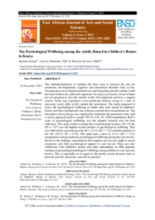The institutionalisation of children has been seen to increase the risk for emotional, developmental, cognitive and attachment disorders later in life. Transitioning out of institutionalised care and integrating into the outside world has been found to be a difficult experience for many care leavers. Some of them are not prepared to face the outside world, feel neglected and lack a support system. Some may experience socio-emotional distress owing to a lack of necessary social skills in life outside the institutions.
The study purposed to assess the psychological wellbeing of adults who were raised in children’s homes and other institutional care in Kenya and had since transitioned out. The descriptive survey design was employed to undertake the quantitative data with a census approach used to sample 294 (F =154, M =140) respondents. Ryff’s scale of psychological wellbeing was the adapted research tool for data collection. The study results revealed that environmental mastery (M =23.46, SD = 7.47) was the highest-scored domain of psychological wellbeing.
This was followed by personal growth (M = 23.14; SD = 7.52) and then purpose to life (M =20.74, SD = 6.58). The study had a mean of 21.31 (SD = 7.15), interpreted as being moderate psychological wellbeing among the care leavers. Based on the findings, organisations that support care leavers ought to create awareness and offer psychological support to care leavers. They can also collaborate with children’s homes and other stakeholders to offer periodic training on promoting psychological wellbeing among children in care and care leavers. This is especially so in regard to the poorly scored domains such as personal growth, autonomy, and self-acceptance.

